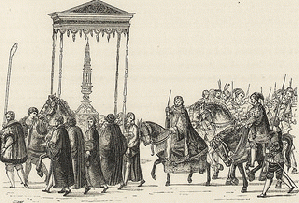
Image from page 342 of .Military and religious life in the Middle Ages and at the period of the Renaissance. (1870)
(Image by Internet Archive Book Images) Details DMCA
Big Gods: How Religion Transformed Cooperation and Conflict is the title of a recently published book by Ara Norenzayan that addresses a wide variety of issues associated with the belief in God and religion. There are currently more than 10,000 religions in the world, the author declares; however, the majority of people follow only a few of them, the religions having unique features that have helped adherents overcome adversities and survive. It appears that the law of obsolescence may also apply to religion these days. New religions emerge and the old ones are being modernized. Believers seem to be looking for alternatives and take pride in associating with a modern religion in the same way they draw satisfaction from consuming prestigious products.
Those religions that cannot attract new followers will eventually be forced to extinction or marginalization. The author of Big Gods calls this process the "cultural winnowing of religion." In line with this argument, surviving religions can be thought of as those business institutions that can sustain competitive challenges by implementing innovative strategies to keep their customers loyal and returning. Similar to a business firm, a religion cannot enlarge its constituency base if it fails to devise strategies that help it survive. Many such strategies have successfully been utilized by religions throughout human history.
The author persistently argues that as societies grow larger and more complex, anonymity becomes a problem that undermines the members' cooperation and compliance with social norms. Thus, the monitoring of individuals, especially those who act like they are around just for a free ride, becomes complicated. Accordingly, the need for a supernatural policing arises and consequently, so does the need for big gods. Cooperation, based on and supported by supernatural monitoring and surveillance mechanisms, keeps prosocial groups from disintegrating. Such mechanism is also needed to legitimize the punishing of those violating societal rules and the rewarding of society's law-abiding members. I think some people respond to religious incentives the same way they respond to economic forces like profit and loss. Many people practice a religion in expectation of heavenly rewards, but more importantly, out of fear of dreadful punishment. Quite possibly, in large prossocial groups, some people may merely fake adherence just to take advantage of the benefits offered by religion without making any personal contribution; these people are looking for a free ride just as they do when it comes to the consumption of public goods produced and provided through the work of others.
As social groups get larger, the need for big gods and their monitoring systems intensifies. In small, close-knit groups, people know and trust one another. They deal directly with one another without taking much risk so there is little need for an intermediary. They can also keep an eye on each other's behavior and evaluate members' contributions to the group. Understandably, people will eagerly help their family members, relatives, and close friends; however, they may not be willing to extend this courtesy toward strangers. For large groups, anonymity impedes personal interactions. People do not know one another and are unable to evaluate the risk of direct interaction; hence the possibility of cheating, violating group norms, and faking devotion increases. As a result, a powerful supernatural deity becomes an essential tool for the monitoring and enforcement of prosocial behavior. Religion teaches us that the all-knowing God has a very elaborate system of surveillance and record keeping of everything we do. According to Islamic teaching, even every breath we take will be recorded on our report card which will then be handed to us on Judgment Day.
Religion can create successful institutions that bond people together and take care of their needs that otherwise might remain unmet. Human beings are social creatures in need of belonging and opportunities to interact with fellow human beings; they experience companionship, express themselves, and seek solutions to their problems. They want to feel important and be loved and wanted. Religions help people to fulfill all these needs. In addition, the human being is a mind-reading creature with an inherent tendency to want to know and to interpret what is going on in the mind of others, what the author calls "mentanalyzing." From time immemorial, our ancestors have wanted to know what their make-believe gods were thinking, what they required from them, what pleased and what made them angry and vengeful. To avoid their gods' punishments, our ancestors always wanted to appease them by doing something that supposedly made them content. They even tried to negotiate and bargain with gods through prayers and rituals.
Without trust, honesty, and individual contribution, prosocial groups cannot flourish. People tend to act more vigilantly if they are being monitored. "Nice people are watched people." Norenzayan calls this the first principle of Big Gods. In economic terms, people respond to both positive and negative incentives. If you know that are held accountable for the consequences of your action, you try earnestly to behave responsibly. The watched students, for instance, cheat less than those who are not watched. People contribute more to a charitable cause when in the presence of the watchful eyes of others instead of donating anonymously in private. To bring attention to their good deeds, they post pictures of themselves on social media while donating blood or volunteering in humanitarian projects.
People believe in an intelligent God; "[intellectual] person-like supernatural beings are compelling as agents who monitor, respond, punish, and reward." God knows everything about everyone, but is especially cognizant and concerned about our misdeeds, which he will punish in the afterlife world. According to Islamic teaching, for example, even every breath we take will be recorded on our report card which will then be handed to us on Judgment Day, a clever ploy indeed employed by almost all religions. Psychologically, of course, people respond more vigorously to negative incentives (punishments) than they do to positive incentives (rewards). Economic experiments have indicated that for rational, risk-averse individuals, the suffering of the loss of $1,000 is indeed much more intense than the pleasure of receiving $1,000.
Historically, the author reminds us, in prosocial groups, the success of economic networks has been dependent on tolerance and trust. Religion has been plausibly invoked as an effective tool to keep trust, honesty, and mutual respect among members without much administrative cost. Religious institutions work well because they have been with us for thousands of years. They are supported by the fear of God's tormenting punishments. Equally, commerce has been an essential prerequisite for the advancement of a religion. The author explains: "Islam's spread in these parts of the world [Africa] owed more to networks of highly disciplined Muslim merchants rather than to highly disciplined Muslim armies." People who share similar beliefs and worship the same deity trust one another better. Additionally, if economic incentives are worthwhile enough, people may also tolerate and cooperate with those who do not hold the same beliefs as they do. Obviously, in traditional societies, people may trust those who believe in a different god/religion, but do not trust those who hold no religious beliefs at all. That takes us to another important principle of the Big Gods. As Norenzayan puts it: "Trust people who believe in God." Believing in anything is better than believing in nothing. As the saying goes, people who do not believe in anything will fall for everything. Traditionally, those who believe in something are credited for being honest and trustworthy and are less vulnerable to temptations and misdeeds.
Conversely, dishonesty and cheating are linked to disbelief. This is still true even in today's modern world. Survey results suggest that the majority of people trust religion, those who believe in religion, and those who are known for their religious convictions. For this reason, in the United States, anti-atheist feelings are widespread and the laws that discriminate against atheists are not only tolerated, but they are popular and protected. In contrast, the laws that safeguard religious beliefs are admired and have often been upheld by the Supreme Court. The recent victory of the Hobby Lobby lawsuit is a case in point.
Throughout the book, the author explains how belief in the supernatural is instrumental to the triumph of prosocial groups and to their economic institutions. In other words, any system whose success depends on truthfulness and cooperation must promote belief in the supernatural. Unquestionably, the monitoring system that comes from a supernatural source functions more effectively, especially in traditional societies. The religious bonding and the resulting mutual trust benefits everyone. People trust one another because they think that the cohesiveness and the survival and of their group depend on mutual trust and the protection of common interests. As author explains, trust and, most importantly, tolerance are more widespread in nations like small European countries. In these countries, because of their strong democratic social and political institutions, distrust of atheism and nonbelievers is weak. Conversely, in countries having weak democratic institutions and a system of laws and regulations that cannot adequately protect the rights of people, trust of nonbelievers is quite low. These countries are usually run by a theocratic government and the democratic institutions have been replaced by the dictatorial rule of religion.
In advanced countries, inclusive democratic institutions provide the same benefits and protection to their citizens as religion does. However, they are secular and do not involve belief in the supernatural. The countries with theocratic, often dictatorial governments are run by religious elites who consider themselves the custodians and the enforcers of God's morality system. In Iran, for example, the government has created Morality Police who patrol city streets to make sure that everyone complies with religious dress and other Islamic codes. They can arrest violators without any warrants. Highly secular countries like Sweden and Denmark have elevated their institutions above and beyond religion. For these countries, going back to religious institutions in the 21st century is a giant step backward. People easily tolerate one another if they share a culture and linage, or if significant economic interests are at stake. For them, the bonding nexus provided by shared religion has been replaced by advanced civil institutions. Norenzayan puts this eloquently: "Secular societies climbed the ladder of religion, and then kicked it away."
If a democratic government can gain the support and trust of the people, there is no need to resort to religion and its supernatural source of monitoring to control them and manage social affairs. "Big Gods reign supreme [only] in places where government is corrupt and there is little faith in it. And when trust in government intensifies, religion loses its grip on society." It seems, the author rightfully argues, that religion is a substitute for government in countries where its political system is corrupt and inept. Both religion and government can provide the same benefits and perform the similar tasks of providing a monitoring system, fostering trust and cooperation, protecting rights and privileges, enforcing laws and regulations, and offering hope and solace in cases of adversity and desperation. However, one does not need to invoke the power of a supernatural and its morality system to function successfully. In other words, government in countries run by theocrats becomes the enforcer of so-called God's laws; never mind that they have in reality been made by whimsical men.





